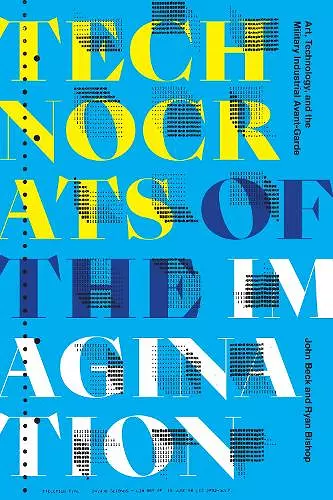Technocrats of the Imagination
Art, Technology, and the Military-Industrial Avant-Garde
John Beck author Ryan Bishop author
Format:Paperback
Publisher:Duke University Press
Published:13th Mar '20
Should be back in stock very soon
This paperback is available in another edition too:
- Hardback£110.00(9781478005957)

In Technocrats of the Imagination John Beck and Ryan Bishop explore the collaborations between the American avant-garde art world and the military-industrial complex during the 1960s, in which artists worked with scientists and engineers in universities, private labs, and museums. For artists, designers, and educators working with the likes of Bell Labs, the RAND Corporation, and the Los Angeles County Museum of Art, experiments in art and technology presaged not only a new aesthetic but a new utopian social order based on collective experimentation. In examining these projects' promises and pitfalls and how they have inspired a new generation of collaborative labs populated by artists, engineers, and scientists, Beck and Bishop reveal the connections between the contemporary art world and the militarized lab model of research that has dominated the sciences since the 1950s.
“In teaching art and technology history now, the hardest tasks are to problematize innovation and to explain with precision the ways in which the midcentury artistic avant-garde in the US was entangled with managerial elites and the military-industrial complex. John Beck and Ryan Bishop convey this history keeping front and center the urgency of its political implications for present-day work in art and technology. I will recommend this book to every artist and researcher I know who works across art, science, and technology.” -- Lisa Cartwright, Professor of Visual Arts, Communication, and Science Studies, University of California, San Diego
“John Beck and Ryan Bishop's sustained, in-depth engagement with the history of artistic and technological forms cuts back to the fundamental paradigms established through the computational advances during the Cold War, offering historical insights that are paramount for critical and political thought. Technocrats of the Imagination is an incredible achievement and an important contribution. I could not recommend it more highly.” -- Jordan Crandall, Professor of Visual Arts, University of California, San Diego
"At the center of Beck and Bishop’s analysis is the history of US liberalism as it mutates from the interventionist agenda of the Progressive Era to the soft-power mechanisms of neoliberalism, with its emphasis on deregulation, free trade, privatization, and the uncoupling of the government from public interests. Technocrats of the Imagination sets out to chart the active—albeit at times unwitting—role that artists played in this political shift. . . . The book’s case studies help us see that this realignment occurred as radical social imagination was displaced by an emphasis on the formal qualities of technology and artistic practice." -- Lindsay Caplan * Art in America *
“I found that this book worked best as an exploration, a cultural critique even, of the intersecting worlds of artists and technologists…. Less a detailed narrative with a sustained historical argument, Technocrats of the Imagination joins a growing body of provocative scholarship from multiple disciplines that connects the histories of art, commerce, culture, science, and technology.”
-- W. Patrick McCray * Technology and Culture *“The book sheds light on the core initial relationships between media artists and labs, with all the consequences of funding, agency and sponsorship, which have since [the 1960s] become codified systems. A compelling read for anybody involved in media art."
* Neural *“John Beck and Ryan Bishop’s Technocrats of the Imagination is an elegant and clever history that both partakes of, and invigoratingly complements, the recent scholarly genealogy of the ‘cultural cold war.’” -- Michael Trask * American Literary History *
“In Technocrats of the Imagination the project of the lab remains incomplete and unresolved. Taking back the lab—or retrieving its stolen promise—is the positive task, and this book offers both eloquent testimony and incipient guide to how we might re-open the apertures of our collective and collaborative potential.” -- Mark Banks * International Journal of Cultural Policy *
ISBN: 9781478006602
Dimensions: unknown
Weight: 363g
240 pages